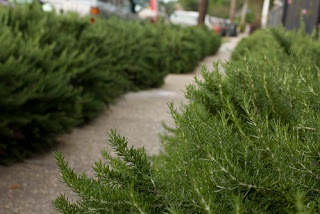from
Behind the French Menu
by
Bryan G. Newman
behindthefrenchmenu@gmail.com
Rosemary
Photograph
courtesy of Andy / Andrew Fogg
www.flickr.com/photos/ndrwfgg/101554662/
Rosemary
Unlike diners in many other countries, most French diners want to know which herbs and spices are used in menu listings. As a result, few French chefs omit from the menu listing details of how a dish was flavored. Seeing the herbs and spices used on the menu tells the diner how the dish will taste.
The wide variety of herbs and spices in French cuisine.
French cuisine uses a wider variety of herbs and spices than any other European country. Many of these herbs came to France with Catherine de Medici. Then in 1553, at age 15, Lorenzo de Medici, the absolute ruler of Florence, sent his daughter Catherine to marry Prince Henry of France (later King Henry II). At that time, Florence was considered the leader and creator of the best European cuisine. Catherine came with a unique wedding retinue that included chefs, cooks, vintners, along with market gardeners. The chefs brought both new recipes and new ways to use the herbs that France already had, including Rosemary. Rosemary is not a French import; it is native to the Mediterranean. Apart from Rosemary’s use as a herb on its own, it is part of France’s two most important herb groups Les Fine Herbes and the Herbes de Provence.
Flowering Rosemarywww.flickr.com/photos/dionysia/109623018/
Later, France would add new herbs, fruits, and vegetables from the New World, India, and Africa. France’s wars and colonies would bring even more. When wealthy French colonists came back to visit France, they often brought their colonial cooks with them. To those cooks, France added the French chefs who had gone to serve the French overseas administration and returned to France with new ideas. They brought into French cuisine the flavors and aromas of new herbs and spices and how they are prepared.

Cultivating Rosemary.
Photograph
courtesy of rmburnes
www.flickr.com/photos/93363727@N00/5126582865/
Rosemary in French cuisine.
French chefs usually prefer fresh herbs because many dried herbs lose much of their flavor and aroma when dried. However, fresh rosemary is always used as a fresh herb because its fresh leaves provide a gentler flavor than the dried variety. In France, obtaining fresh rosemary is never a problem as it is an evergreen plant. Wild Rosemary and that grown by market gardeners assure French consumers of a plentiful supply all year round. Mediterranean wild rosemary is naturally abundant as it can withstand heat and requires little water. In France and many Mediterranean countries, rosemary is also cultivated as an ornamental shrub that may be seen in hedges alongside roads.
Natural rosemary hedges along a path www.flickr.com/photos/derek_b/8801551042/
Rosemary on French menus:
Calamars Grillés au Romarin, Salade de Roquettes et Copeaux de Parmesan – Calamari, squid, grilled with rosemary and served with a rocket salad flavored with shavings of parmesan cheese.
Carré d'Agneau Rôti au Thym et au Romarin – A rack of lamb roasted with thyme and rosemary.

Orange,
Lemon, and Rosemary Roast Chicken
Photograph courtesy of the GbergT
www.flickr.com/photos/habesha/411908215/
Filet d'Agneau du Charolais aux Senteurs d’Ail et Romarin, Écrasé de Patates Douces - A Charolais lamb fillet, the tenderloin, scented with garlic and tosemary and served with crushed sweet potatoes. Écrasé or écrasées in French may be translated on your menu as mashed; however, the word for mashed in French is purée. Écrasé indicates a rougher texture.
Fraîcheur de Melon et Mousse de Chèvre au Romarin – Chilled melon served with a goat’s cheese mousse, flavored with rosemary.
Mignon de Veau à la Fondue d'Oignon, Jus de Viande au Romarin - A cut from a veal fillet, the veal tenderloin, served on a bed of very well cooked onions, practically an onion jam. The veal is served with the cooking juices from the meat that is flavored with rosemary.
Pêche Rôtie au Miel et Romarin – Peach roasted in honey and rosemary.

Racks of lamb with
rosemary
Photograph courtesy
of Adrian Gonzales
www.flickr.com/photos/virexmachina/3511435165/
Filet de Dorade Royale Rôti
aux Herbes de Provence et
Son Beurre Blanc
- A filet of gilthead, the fish,
roasted with the herbs of Provence and
served with a white butter sauce.

A whole roasted gilthead with
rosemary butter.
Photograph courtesy of Peter Smith
www.flickr.com/photos/purpaboo/4499071875/
Rosemary as a homeopathic
medicine.
Rosemary, in French homeopathic medicine, is used for many aches and pains. All French homeopathic pharmacies and there are nearly as many as regular pharmacies, will offer rosemary in many forms and explain their uses. There are rosemary herbal teas, (tisanes in French), rosemary creams, and more.
If you travel a great deal, you will find rosemary all over the world, especially in Asia, where it is just as much at home as it is in the Mediterranean.
Rosemary in the languages of France's neighbors:
(Catalan - romaní ), (Dutch - rozemarijn), (German – rosmarin), (Italian – rosmarino), (Spanish – romero), (Latin – salvia rosmarinus).
---------------------
Searching for the meaning of words, names or phrases
on
a French menu?
Just add the word, words, or phrase that you are searching for to the words "Behind the French Menu" (best when including the inverted commas), and search with Google. Behind the French Menu’s links, include hundreds of words, names, and phrases that are seen on French menus. There are over 450 articles that include over 4,000 French dishes with English translations and explanations.
----------
Behind the French Menu
by
Bryan G. Newman
behindthefrenchmenu@gmail.com
Copyright 2010, 2015, 2021
--------------------




No comments:
Post a Comment